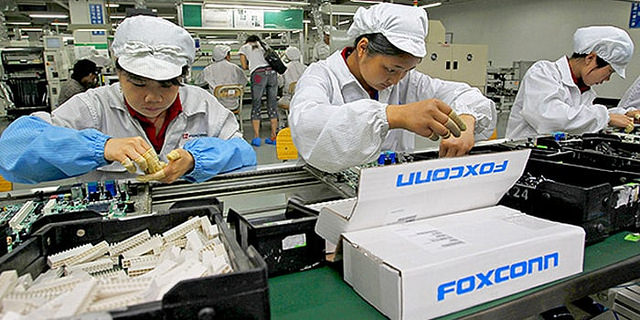Apple has become the first American company to reach US$1 trillion in market capitalisation – US$1,000,000,000,000 in stockmarket value. Behind this glittering success, however, lies a series of unresolved ethical dilemmas.
The approaches of Apple and the other giant US platform technology companies (Google, Facebook, Amazon) to corporate taxation, concentration and privacy have attracted widespread criticism.
But as a manufacturing company Apple faces a more deep-seated problem. This involves the millions of people employed in its supply chain, which is largely located in China with the major contractor Foxconn.
Our research shows human rights, environmental and ethical problems persist inside Apple’s vast global supply chains.
Low pay, poor working conditions and environmental hazards in supplier factories in China and across Asia are sources of long-running controversies. Suicides of workers subject to the intensive work regime of these factories shocked Apple into action.
Apple does address these disturbing issues in its annual Supplier Responsibility Progress Report. Progress has been uneven and limited, but the company has created the appearance of corporate social responsibility. Any reputational damage does not seem to undermine financial results.
Still, for a company as successful as Apple, the failure to find a permanent solution to recurrent environmental and labour issues in its global value chain is not acceptable.
What makes Apple successful
Apple is not the largest smart phone manufacturer in the world (the increasingly sophisticated Samsung and Huawei are), it is just the most profitable. Its profit margins have topped 20% for more than a decade. While its profit has slipped in recent years, it is much higher than its competitors.
The result is a huge cash hoard. Apple holds more cash than most American industries combined, and even many countries.
Apple’s sustained competitive advantage is not simply due to innovation, superior design and marketing. It’s also a result of its domination of the advanced consumer electronics supply chain. Apple has effectively created a closed ecosystem, controlling every part of the supply chain from design to retail.
Disaggregating the global value chain enables the most profitable activities, including design, finance, marketing and sales, to be retained in the home country. The less profitable labour-intensive activities are given to contractors in developing countries, where wages and conditions are often much poorer.
Apple sources most of its components from manufacturers in Asia. The poor working conditions at the bottom of these value chains gave rise to the term “electronics sweatshop”.
According to activist Li Qiang, of US-based China Labour Watch:
Without China, Apple wouldn’t be the company it is today. No other country can provide labour so cheaply and make its products so quickly.
But the interplay between global economic forces and local circumstances poses challenges for economic security, and business accountability, transparency and integrity.
Arm’s-length morality
In its Supplier Code of Conduct, Apple states:
Apple suppliers are required to provide safe working conditions, treat workers with dignity and respect, act fairly and ethically, and use environmentally responsible practices wherever they make products or perform services for Apple […] Apple will assess its suppliers’ compliance with this Code, and any violations of this Code may jeopardize the supplier’s business relationship with Apple, up to and including termination.
This statement goes a long way in explaining the normative basis on which Apple operates: an arm’s-length morality that imposes responsibility on others.
As Apple shifts the burden of cost and production, its suppliers make the labourers carry the burden through low wages and unsafe conditions.
Regrettably, workers receive little protection from government or regulatory authorities. Independent trade unions are forbidden in China. Labour strikes are illegal and considered counter-revolutionary (though they often occur in local disputes).
The result is a degree of labour flexibility that creates a race to the bottom, threatening the most basic labour standards and environmental standards in developing countries.
Ensuring integrity in the global value chain
It appears the beauty of Apple’s brilliant design ultimately rests upon the suffering of workers in electronic sweatshops, where human rights, labour standards, environmental safety and business integrity are routinely ignored.
These abuses were first brought to Apple’s attention in 2006. The company has made some efforts to eradicate problems and enforce higher standards.
However, there is evidence to suggest the intensity of the production regimes being enforced to meet product launches often overwhelms Apple’s interventions to advance audit and management systems and improve standards in suppliers’ factories. Bleak working conditions persist throughout much of the electronics supply chain in Asia.
With Apple’s vast cash reserves, the obvious question is why doesn’t it resolve these problems once and for all? The answer is that to a significant degree Apple is held hostage by the capital markets to control costs and feels compelled to disgorge tens of billions of dollars in dividends and share buy-backs or face the wrath of the hedge funds. The laser focus is on Apple’s share price, not the welfare of its contractors’ employees.
The future innovative capacity (and ethical principles) of Apple are in jeopardy when value creation becomes defined as value extraction. Boards focus solely upon “returning” cash to shareholders who never provided the cash to develop the company in the first place.
As the market leader, and the most successful consumer electronics company in the world, Apple has a particular responsibility to ensure the integrity and responsibility of its value chain.



 Nvidia CEO Jensen Huang Says AI Investment Boom Is Just Beginning as NVDA Shares Surge
Nvidia CEO Jensen Huang Says AI Investment Boom Is Just Beginning as NVDA Shares Surge  Amazon Stock Rebounds After Earnings as $200B Capex Plan Sparks AI Spending Debate
Amazon Stock Rebounds After Earnings as $200B Capex Plan Sparks AI Spending Debate  SpaceX Updates Starlink Privacy Policy to Allow AI Training as xAI Merger Talks and IPO Loom
SpaceX Updates Starlink Privacy Policy to Allow AI Training as xAI Merger Talks and IPO Loom  SoftBank and Intel Partner to Develop Next-Generation Memory Chips for AI Data Centers
SoftBank and Intel Partner to Develop Next-Generation Memory Chips for AI Data Centers  SpaceX Pushes for Early Stock Index Inclusion Ahead of Potential Record-Breaking IPO
SpaceX Pushes for Early Stock Index Inclusion Ahead of Potential Record-Breaking IPO  Oracle Plans $45–$50 Billion Funding Push in 2026 to Expand Cloud and AI Infrastructure
Oracle Plans $45–$50 Billion Funding Push in 2026 to Expand Cloud and AI Infrastructure  Elon Musk’s Empire: SpaceX, Tesla, and xAI Merger Talks Spark Investor Debate
Elon Musk’s Empire: SpaceX, Tesla, and xAI Merger Talks Spark Investor Debate  Google Cloud and Liberty Global Forge Strategic AI Partnership to Transform European Telecom Services
Google Cloud and Liberty Global Forge Strategic AI Partnership to Transform European Telecom Services  Nvidia, ByteDance, and the U.S.-China AI Chip Standoff Over H200 Exports
Nvidia, ByteDance, and the U.S.-China AI Chip Standoff Over H200 Exports  OpenAI Expands Enterprise AI Strategy With Major Hiring Push Ahead of New Business Offering
OpenAI Expands Enterprise AI Strategy With Major Hiring Push Ahead of New Business Offering 

































